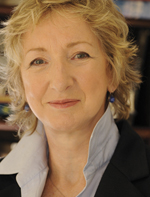…and empowering women to take control of their financial futures.
℘℘℘
Profiling so many successful Irish people working in the financial industry has me questioning my own relationship with money.
I don’t ever remember anyone talking to me about investing when I was a student. The nun who was supposed to teach us about bookkeeping and commerce used to read to us from the Lives of the Saints. I suspect she didn’t know anything about balance sheets. I do remember an ad on television – for the Irish Permanent Building Society – that offered four percent tax-free on chairs. It was years before it occurred to me that whoever was doing the voice-over was saying “shares” not chairs.
We never talked about money in our house, and my first experience with profit and loss left me with a deep distrust of financial transactions. It had to do with a pretty little white calf my father gave to me. Whitey was separated from her mother soon after she was born – it was the way of the farm – calves were fed by hand so that mama cow could get back to producing milk for human consumption.
I loved Whitey. I would rush home from school to feed her, so proud that my father had trusted me with such a big responsibility. All was good until the day I dropped my school bag in the house and ran out to find that Whitey was missing – her stall empty. I was stunned to learn that she’d been sold at market.
“You now have five pounds in your post office account,” my mother informed me rather nonchalantly. I suppose she meant it as a consolation, but there was no comfort there.
Another incident involving money happened when I was 21. On my birthday, the head of the HR office called me in to say it was time for me to join the company’s pension scheme. This sent me into a panic. I saw myself growing old working a job that was okay – but – surely life had more to offer? Within months, I had handed in my notice and was headed to America.
I wish I had known someone like Kathleen Murphy back then, someone who would have talked some sense into me. Not to stop me from immigrating, but to tell me that joining the pension scheme was a good idea and it didn’t mean I had to work for the same company all my life. Someone who had explained to me, in a way that made sense, that following your heart and your passion is all well and good, but life goes by very fast, and no matter how good you are at saving – you have to learn how to make your money work for you.
A recent report by Justice in Aging shows that a significant percentage of older women are struggling to stay out of poverty. There are reasons for this. Women are paid less than men, and more often than not, they are the caregivers; leaving the job market to look after children, and later, caring for elderly parents. Or, as single women, or through divorce, or simply because they outlive their spouses, they find themselves at a financial disadvantage.
After the death of her father at just 57, Kathleen Murphy witnessed her mother’s struggle with money, and now, as Fidelity’s President of Personal Investing, she has made it her mission to educate women about finance. She and her team are not only sharing their expertise with women of all ages through webcasts and country-wide talks, they are educating millennials and Gen X. Turns out you are never too young – or too old – to start learning about how to make your money work for you.
Within a short time of finishing my conversation with Kathleen, who intuited that I could use some financial guidance, I received a call from a young woman named Kelly, a financial adviser at Fidelity. I made an appointment to meet with her.
I’m ready to listen!
Mórtas Cine


Leave a Reply